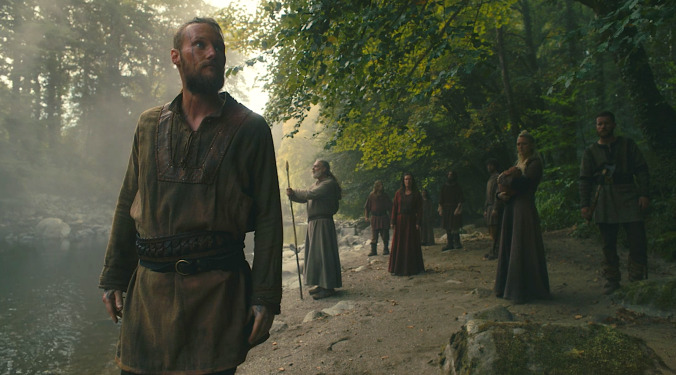Vikings makes echoes of former greatness as Ubbe walks a new world


“We’re close.” “Close?” “Yes, to something. I don’t know what.”
I’ve laid out my criticisms of Vikings’ overall direction since (and for a time before) the death of Ragnar Lothbrok, at length. So here’s where I say that “It’s Only Magic” finds a way to recall Vikings’ at its best—for a little while. (It’s qualified praise, as I’m still me, after all.) As Ubbe and his followers explore what they assume to be Othere’s fabled Golden Land, with strange new creatures skittering through the abundant trees and a shimmering lake offering the sea-ravaged travelers a blissfully bracing swim, Vikings recaptures a sense of wonder.
When Ragnar, Lagertha, Floki, Rollo, and their warriors first set feet onto the wet sands outside of Lindisfarne, it was epic, in the truest sense. After Vikings had successfully introduced that the idea of a wider world outside their own, hardscrabble one was not just blinkered but unthinkable, Ragnar Lothbrok’s use of the untested sunstone to navigate across the ocean to this unremarkable spit of land felt, in the telling, like the sort of achievement that would lend credence to a guy’s suspicions that he was both descended from the gods, and destined for great things. To the unassuming and doomed English monks, the viking arrival at Lindesfarne wasn’t a piece of thousand-years-hence Jeopardy trivia, but a pivotal event in world history, and, for Ragnar Lothbrok, the defining moment in his legacy.
Here, Ubbe walks in his father’s footsteps. Except his (albeit ramshackle) discovery is even more impressive. In distance traveled, if nothing else. Setting up camp alongside Torvi and baby Ragnar with his dozen or so surviving followers, Ubbe Ragnarsson, too, is the first man (for the purposes of Vikings, anyway) to encounter a new world. (“It’s a new world,” Ubbe proclaims, helpfully, upon spying the impossibly green reaches of their landing spot from a lofty cliff.) And here’s where we—as with England and Ragnar—know things that the Norse do not, and could never. About the inevitable cultural and military clashes, and horrible atrocities, and eventual historical winners and losers. But, at its best, Vikings has drawn these moments as if on a fresh and limitless canvas. Small boats, brave people, the world suddenly, and terrifyingly, far larger and more mysterious than they’d ever dreamed.
Othere mocks Ubbe at one quiet interlude upon their arrival for Ubbe’s fearful wondering if the old gods will follow them to this new place—and if they’ll be recognizable if they do. “Maybe you’re not so much like your father after all,” the monk says (still irritatingly teasing out his connection both to Ragnar and Athelstan). But here is where Ubbe is most like Ragnar Lothbrok, staring out into a wondrous, perilous wilderness, an impossible and uncharted (they didn’t have a sunstone) distance from home, and entertaining suspicions that the world is a lot more interesting than his culture always told him it was. Ubbe’s not Ragnar, but, as the true inheritor of his father’s explorer’s spirit, he’s, finally, his own person.
Before Vikings slumped into internecine squabbling and bedroll-hopping and tedious foreign court interludes, it was this raw, electric sense of the unexplored that gave it power. (That and Travis Fimmel.) Here, when Ubbe and his people see their first bald eagle (as, historically, they’re likely in the future Canadian coast they came to call Vinland), and when they first see footprints not their own on a riverbank, the weight of the moments lands with goosebump-raising power. And, sure, there are inevitable glimpses of shadowy figures in the trees, howls that might be wolves at night while the Norse lie unsleeping in their newly constructed shelter, and, eventually, a single, inarguably human-made carving found in the woods by Othere. (While Othere’s solo voyage into the woods is shot with admirably crafted tension, the predatory cuts and pans yet feel superfluous to the portentousness of every step.)
Here, again, we acknowledge what we know about the next thousand years of contact between the enigmatic people the vikings have come to call “Skrælings” and European settlers, just as we recognize that a show made by white people about white colonists to North America is hardly going to be all it could be when it comes to telling that story. But it’s a hell of a story. And, as Ubbe, making a choice upon realizing he’s on the brink of his first contact with an entire other people, orders the Norse to leave an offering of gifts from their meager possessions (a comb, a bracelet, runes, Ubbe’s axe), it feels like a momentous thing. (The camera pulls back on the tableau, underscoring how goddamned exciting their discovery will be for archaeologists.) When, the next morning, the Norse find, in their gifts’ place, matching but inscrutable items (including a stone axe for Ubbe’s iron one), the moment of communication—as perilously unreadable as it is—rings with wondrous significance.
I could go on—right up until the cliffhanger where Ubbe’s band, taking the step of searching out the unseen people’s camp, are suddenly surrounded by bow-wielding, painted warriors in superior numbers. And part of me wishes Vikings would go on, too, ditching the bombast of English war and the tedium of Kattegat politics in favor of this story. But that’s not in the cards, and, as noted, it’s not a story I trust Michael Hirst and his fellow European storytellers to handle properly anyway. But, for what it is, this initial encounter between the vikings and the people of this new/ancient land is powerful, and meaningful.
Ragnar’s looming legacy encompasses England, too, as Wessex prepares for war with his sons, and King Alfred (seen all episode occasionally keeling over from the Crohn’s disease that modern scholars have diagnoses him with) wobblingly rallies his troops by essentially telling them that those vikings aren’t all they’re cracked up to be, you guys. There’s an apt but ham-handed parallelism in this final Vikings (not viking) invasion of England, as not only do we get flashbacks of the young Alfred and Ivar playing their chess game, but also witness both leaders literally stumbling under the weight of their various afflictions. (Ivar steps awkwardly in a hole, Alfred tumbles gracelessly from his horse.) In their long-ago chess match, Alfred had the upper hand, as Ivar had never played the game before. (Not exactly, anyway.) But Ivar The Boneless is nothing if not a quick learner (at least when it comes to power plays), so, here, it’s Ivar who appears to have the edge, even as a countryside-obscuring fog descends to eliminate the strategic advantage he’d assumed by adopting Ragnar’s ideal elevated spot as his HQ. Glaring at the hole he’d nearly broken his leg in, Ivar tells Harald and Hvitserk his plan. “I’m going to cripple him,” he sneers, leaving us to imagine the major action setpiece Vikings has in store for us over the series final two episodes.
And that’s all fun stuff—Vikings, as much as I long for a deeper delve into its characters and view of history, has been known to mount a truly excellent action sequence along the way. What’s more interesting in the buildup to that conflict is Alfred’s adoption of the same xenophobic messaging that Ivar and Harald fed so successfully to the people of Kattegat. Dropping the “pagans” bomb repeatedly, and assuring his men that “the risen Christ” is on their side (“How is it even conceivable that we could lose!”), Alfred—a temperamentally compromise-minded leader—goes full nativist ideologue, shaving his locks into a rough-chopped battle haircut and hyping up his anxious troops with an Agincourt-style appeal to their moral and cultural superiority. (It works in the moment, although the fact that the anointed king soon after falls unconscious to the ground can’t help morale much.)
Ragnar Lothbrok was no saint. Or the viking equivalent. But his raids were fueled by a nascent awakening of some greater and more all-encompassing curiosity. The reality of raiding, ruling, and simply living in a world that hadn’t received that same divine spark of understanding left him to flail against expectation. (His body count is just as high as anyone’s.) But Vikings, through Fimmel, successfully presented a sketch of a truly transcendent figure whose incomplete grasp of something larger yet proved unequal to the responsibilities it conferred. Here, the vikings and the English will fight thanks to power-hungry men cynically exploiting Ragnar’s memory and their countrymen’s backward-looking preconceptions. I’ve yet to decide how much I think Hirst is aware of any commentary on his own initial myth-making, but it’s undeniably intentional that what we are presented with in this “final battle” (as Alfred puts it) is a debased and dispiritingly modern evolution of Ragnar Lothbrok’s complicated legacy.
Stray observations
- Kattegat’s story is over (at least as far as I’m concerned), so Ingrid and Erik’s ongoing power struggles are deeply, deeply dull. Even as the blinded Erik plots (alongside a rightfully terrified slave-accomplice) to murder his queen, and Ingrid shows her mettle in wrangling a roomful of unimpressed Jarls into paying the taxes necessary to shore up the region’s defenses.
- Lucy Martin’s “witch,” Ingrid, might be Vikings’ examination of the evolution of female power after the death of Lagertha, but, if so, it’s an awfully shallow one.
- As impressed as I was by the patience with which the Golden Land story unfolded, enough with the sunbeams filtering through the trees, already. We get it. Tone it down.
- Ivar bemoans to Hvitserk, “Nobody talks about Ragnar any more.” Which is a bad sign for the ambitious Ivar’s chances, since the episode features multiple instances of people mentioning Ragnar in reverent tones. As Ragnar told Bjorn, beware of anyone in it for the fame.
- Hvitserk mentions that Ivar’s eyes have turned a deep blue, a trait, he says, that always warned his brothers that he was “in great danger of hurting” himself.
- Along those lines, the Seer is trotted out again, with Ivar seeking out his former nemesis to finally stop with the riddles and tell him his destiny, dammit. The long dead but ever-present Seer doesn’t, telling Ivar only, “In some ways, it will not surprise you.” As clumsy a plot device as the Seer has always been, Ivar’s acceptance of that fact (unsurprisingly, coming, as it does, from his own mind) is at least a little haunting.